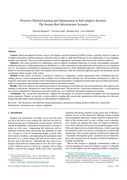New publication in Information and Software Technology [10.01.22]
Christian Krupitzer from the Department of Food Informatics is author of the publication "Proactive Hybrid Learning and Optimisation in Self-adaptive Systems: The Swarm-fleet Infrastructure Scenario" in Information and Software Technology (Impact Factor: 2.730).The publication "Proactive Hybrid Learning and Optimisation in Self-adaptive Systems: The Swarm-fleet Infrastructure Scenario" by Christian Krupitzer (Department of Food Informatics, University of Hohenheim) with co-authors Christian Gruhl, Bernhard Sick (both Universität Kassel) and Sven Tomforde (Christian-Albrechts-Universität zu Kiel) was published in Elsevier Information and Software Technology (Impact Factor: 2.730).
Smart and adaptive Systems, such as self-adaptive and self-organising (SASO) systems, typically consist of a large set of highly autonomous and heterogeneous subsystems that are able to adapt their behaviour to the requirements of ever-changing, dynamic environments. Their successful operation is based on appropriate modelling of the internal and external conditions. The control problem for establishing a near-to-optimal coordinated behaviour of systems with multiple, potentially conflicting objectives is either approached in a distributed (i.e., fully autonomous by the autonomous subsystems) or in a centralised way (i.e. one instance controlling the optimisation and planning process). In the distributed approach, selfish behaviour and being limited to local knowledge may lead to sub-optimal system behaviour, while the centralised approach ignores the autonomy and the coordination efforts of parts of the system. In this article, we present a concept for a hybrid (i.e., integrating a central optimisation with a distributed decision-making process) system management that combines local reinforcement learning and self-awareness mechanisms of fully autonomous subsystems with external system-wide planning and optimisation of adaptation freedom that steers the behaviour dynamically by issuing plans and guidelines augmented with incentivisation schemes. This work addresses the inherent uncertainty of the dynamic system behaviour, the local autonomous and context-aware learning of subsystems, and proactive control based on adaptiveness. We provide the ’swarm-fleet infrastructure’ -- a self-organised taxi service established by autonomous, privately-owned cars -- as a testbed for structured comparison of systems. The ’swarm-fleet infrastructure’ supports the advantages of a proactive hybrid self-adaptive and self-organising system operation. Further, we provide a system model to combine the system-wide optimisation while ensuring local decision-making through reinforcement learning for individualised configurations.
The publication is available in Sciencedirect.


